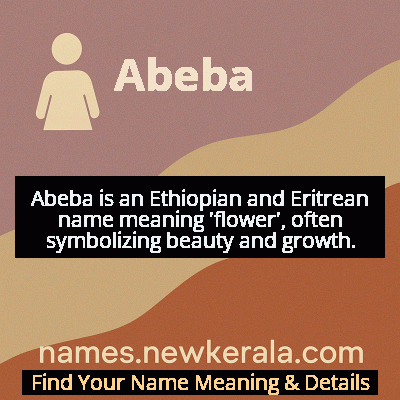Abeba Name Meaning & Details
Origin, Popularity, Numerology Analysis & Name Meaning of Abeba
Discover the origin, meaning, and cultural significance of the name ABEBA. Delve into its historical roots and explore the lasting impact it has had on communities and traditions.
Name
Abeba
Gender
Female
Origin
African
Lucky Number
2
Meaning of the Name - Abeba
Abeba is an Ethiopian and Eritrean name meaning 'flower', often symbolizing beauty and growth.
Abeba - Complete Numerology Analysis
Your Numerology Number
Based on Pythagorean Numerology System
Ruling Planet
Moon
Positive Nature
Diplomatic, friendly, artistic, empathetic.
Negative Traits
Over-sensitive, moody, indecisive, prone to self-pity.
Lucky Colours
Green, cream, white.
Lucky Days
Monday.
Lucky Stones
Pearl, moonstone.
Harmony Numbers
1, 3, 4.
Best Suited Professions
Diplomats, mediators, caregivers, artists.
What People Like About You
Cooperative spirit, friendliness, artistic talent.
Famous People Named Abeba
Abeba Aregawi
Athlete
World Champion middle-distance runner who won gold in the 1500m at the 2013 World Championships
Abeba Ariga
Politician
Ethiopian women's rights activist and member of parliament who advocated for gender equality
Abeba Tesfagiorgis
Educator
Renowned Ethiopian educator and founder of literacy programs for rural communities
Abeba Tsegaye
Musician
Traditional Ethiopian vocalist known for preserving and modernizing ancient musical traditions
Name Variations & International Equivalents
Click on blue names to explore their detailed meanings. Gray names with will be available soon.
Cultural & Historical Significance
Extended Personality Analysis
Individuals named Abeba typically exhibit personality traits that reflect their floral namesake - they combine natural grace with remarkable resilience. These individuals often possess an innate elegance and emotional depth that makes them particularly attuned to beauty in all its forms. Their nurturing disposition makes them excellent caregivers, friends, and community builders, often serving as emotional anchors in their social circles. Abebas tend to be highly intuitive, with strong empathetic abilities that allow them to understand others' emotions and needs without explicit communication. They frequently demonstrate creativity and artistic talent, whether in traditional arts, music, or innovative problem-solving. Despite their gentle exterior, many Abebas possess surprising inner strength and adaptability, able to thrive in challenging circumstances while maintaining their positive outlook. Their communication style tends to be diplomatic and thoughtful, making them effective mediators and trusted confidantes. The combination of sensitivity and resilience often leads Abebas to careers in healing professions, education, arts, or community leadership where their natural compassion and strength can benefit others.
Modern Usage & Popularity
In contemporary times, Abeba maintains strong popularity within Ethiopia while gaining recognition internationally through diaspora communities. The name consistently ranks among the top 100 female names in Ethiopia, demonstrating its enduring appeal across generations. Among Ethiopian communities abroad, Abeba serves as an important cultural marker, helping maintain connections to heritage while being phonetically accessible in English and other languages. Modern parents choosing this name often appreciate its natural meaning, cultural significance, and elegant sound. The name has seen some crossover appeal among non-Ethiopian parents interested in meaningful, internationally-flavored names, particularly those drawn to nature-inspired names. Social media and global connectivity have increased the name's visibility, with many young Abebas sharing their cultural experiences online. While traditional in origin, the name fits well with contemporary naming trends that favor meaningful, nature-based names with cultural depth. Its usage patterns show that Abeba successfully bridges traditional and modern naming practices, appealing to parents seeking names with both cultural authenticity and universal beauty.
Symbolic & Spiritual Meanings
The symbolic meanings of Abeba extend far beyond its literal translation of 'flower,' encompassing rich metaphorical significance in Ethiopian cultural context. Flowers in Ethiopian symbolism represent the delicate balance between beauty and resilience - the ability to maintain grace under pressure and bloom in challenging circumstances. Abeba symbolizes the human capacity for growth and transformation, mirroring how flowers progress from bud to full bloom. The name carries connotations of purity and innocence, yet also represents maturity and the wisdom that comes through life's seasons. In Ethiopian spiritual understanding, flowers symbolize the soul's journey - starting as a seed of potential, growing through experience, and eventually blossoming into full expression. The cyclical nature of flowers connects to concepts of renewal, hope, and the eternal return that features prominently in Ethiopian philosophical traditions. Abeba also represents connection to the land and natural world, embodying the Ethiopian concept of 'የመሬት ልጅ' (child of the earth) that emphasizes harmony with nature. The name's symbolism includes both individual beauty and collective flourishing, much like how single flowers contribute to a garden's overall splendor.

